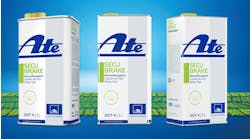Ask the Expert: When testing coolant, what should fleet personnel look for?
Q: When testing coolant, what should fleet personnel look for?
A: We encourage technicians to look for five different items.
First, color to help identify the type of coolant.
Then clarity, to see if there is contamination that makes the coolant dark or murky.
After that, we suggest checking the odor of the coolant, since a foul odor like ammonia can indicate an abnormally high pH level. Excessively high pH can lead to degradation of soft metals like copper, brass and aluminum, as well as o-rings, gaskets and seals. Unusually low pH typically indicates that damaging corrosion is in process.
Of course freeze point is a critical part of the test.
And, finally, test for chemical protection, particularly nitrite levels. Low nitrite levels lead to cavitation and pitting of cylinder liners, and today’s extended coolant change intervals increase the likelihood of nitrite depletion. In such cases, the use of a quality additive blend like our PenCool 3000 can restore nitrite levels and other ingredients to the proper level, renewing the protection originally afforded by the coolant.
Information provided by: Joe Long, The Penray Companies




